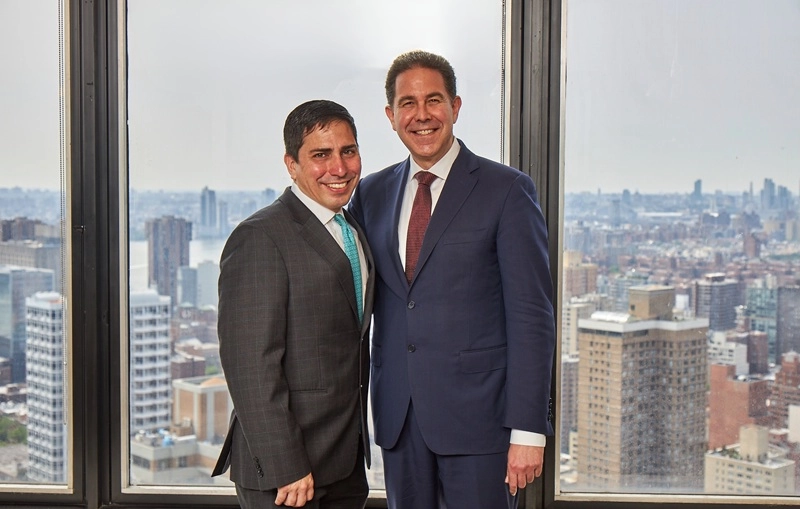/
Medical Malpractice/
Birth Injuries/
Hypoxic Ischemic Encephalopathy (HIE)
Hypoxic Ischemic Encephalopathy (HIE) Lawyers
Hypoxic-ischemic encephalopathy (HIE) can have lifelong impacts. If your child suffered from oxygen deprivation at birth, the experienced New York HIE attorneys at Jacob D. Fuchsberg Law Firm will fight tirelessly to hold negligent parties accountable.




















Your Trusted Hypoxic Ischemic Encephalopathy Attorneys in NYC

You never expect the birth of a child, one of the most important and anticipated moments in someone's life, could take expectations of joy and turn them into tragedy due to a negligent act by the medical experts responsible for your newborn’s safety.
Lack of oxygen or oxygen deprivation to a baby’s brain during birth, known as Hypoxic-Ischemic Encephalopathy (HIE), can have traumatic health consequences, including cerebral palsy, brain injury, long term disabilities, developmental delays, and, sadly, newborn fatality.
Unfortunately, Hypoxic-Ischemic Encephalopathy (HIE) is one of the most common results of birth complications in the United States.
The HIE lawyers at Jacob D. Fuchsberg Law Firm can help when the unimaginable happens.
Often, birth injury cases involving HEI are often far too challenging for general practice law firms. Our law firm not only represents the families of HIE-afflicted infants but we work to educate our clients while providing kindness and support through such a trying time.
The birth injury lawyers at our firm have decades of experience helping families navigate the difficult legal process following birth trauma and medical errors, including HIE claims due to medical malpractice.
If your child has suffered an injury due to preventable birth complications, such as some cases of hypoxic-ischemic encephalopathy, or you have any suspicion that this is the case, contact the HIE attorneys at Jacob D. Fuchsberg Law Firm as soon as possible to discuss your legal options and next steps.
Call 212-869-3500 today or contact us online for a no-risk, free case evaluation with an experienced HIE attorney.
.svg)
Meet Our Attorneys
.svg)
Why Hire a Hypoxic Ischemic Encephalopathy Lawyer?
Cases of HIE can sometimes be the unfortunate result of negligent medical professionals. Symptoms can range from mild to critical and have a lifetime impact on both the parents and child.
With the need to manage ongoing symptoms comes long-term costs to the family in monetary expenses and quality of life. When HIE is the unfortunate result of medical malpractice, New York City parents need an experienced birth injury attorney that can secure the relief necessary to cover the extensive costs of:






- Comprehensive care for the child to improve health, comfort, and quality of life
- Counseling and support for the family, including marriage support counseling
- Wages lost due to the need to provide care for a disabled or special-needs child
- In-home care or assistance facilitates the quality of life for the whole family and creates balance
- Financial advising for the planning and budgeting for the lifetime care of your child
- Vehicles that are wheelchair accessible
#cta_start
Is Your Baby Affected by HIE?
Our experienced HIE attorneys in New York are committed to helping you secure the compensation necessary to cover lifelong care and support.
#cta_end
What Is Hypoxic-Ischemic Encephalopathy?
HIE is a brain dysfunction that develops due to the brain not receiving enough oxygen or blood flow over time. To break down the terms: Hypoxic means the brain is not receiving enough oxygen; ischemic is not enough blood flow; encephalopathy is the resulting brain disorder.
If the brain does not receive enough oxygen or blood flow, the result is the death of brain cells, which can happen within minutes.
If blood or oxygen has been interrupted to the brain, there is a chance that the rest of the body has also been starved of oxygen. Damage can occur in other organs like the heart, kidneys, liver, and bowels. Fortunately, these organs typically return to normal function.
HIE can be suffered during childbirth due to obstetric complications during the labor and delivery process. It is also possible for HIE to result from prenatal complications or events.
HIE is scored for its severity and is ranked as mild (stage 1), moderate (stage 2), or severe (stage 3). Sarnet and Sarnet described the most widely used HIE score in 1976.
Newborns are evaluated on muscle control, neonatal reflexes, autonomic function (heart rate, pupillary response), level of consciousness, and seizures. The following criteria score the severity:
Stage 1 (Mild)
- Level of Consciousness - Hyperalert
- Muscle tone - Normal
- Deep tendon reflexes - Increased
- Primitive reflexes - Exaggerated
- Autonomic function - Jitteriness, tachycardia, mydriasis
- Seizures - Absent
Stage 2 (Moderate)
- Level of Consciousness - Lethargic
- Muscle tone - Mild hypotonia
- Deep tendon reflexes - Increased or decreased
- Primitive reflexes - Weak
- Autonomic function - Bradycardia miosis
- Seizures - Common
Stage 1 (Severe)
- Level of Consciousness - Stuporous
- Muscle tone - Flaccid
- Deep tendon reflexes - Decreased or absent
- Primitive reflexes - Absent
- Autonomic function - Severe dysfunction/variable
- Seizures - Frequent or difficult to control
Brain Activity as an Indicator
In addition to scoring, a diagnosis can begin immediately in the case of significant risk factors like a low heart rate or fetal distress during labor and delivery. If the baby needs help with breathing or a low heart rate after the delivery, this can also be an indicator that HIE is suspected.
A neurologist can perform confirmation of an HIE diagnosis. The neurologist will monitor the baby with an electroencephalogram for signs of brain dysfunction and seizures.
Additionally, the neurologist will use magnetic resonance imaging (MRI) for neuroimaging tests to check for signs of brain injury.
Potential Causes of Hypoxic Ischemic Encephalopathy
HEI can occur during fetal development, though it is more common during labor and delivery. Certain postnatal problems can also be causes of HIE.
Unfortunately, prenatal problems do happen, and not all can be addressed, but prenatal care has become more and more advanced. With HIE, prenatal causes are the least likely causes. The most common causes of HIE are:
- Preeclampsia
- Congenital fetal infections
- Heart disease
- Severe fetal anemia
- Maternal diabetes with vascular disease
- Blood clots in the placenta
- Umbilical cord problems
- Prolonged late stages of labor
- Highly reduced blood pressure in the mother
- Excessive placenta bleeding
- Abnormal position of the fetus, such as the breech position
- Rupture of the uterus
#cta_start
Speak with an HIE Lawyer Today about Your Next Steps
If your child has suffered from HIE, Jacob D. Fuchsberg Law Firm is here to fight for your family’s future.
#cta_end
Common Symptoms of Hypoxic Ischemic Encephalopathy
Tragically, the symptoms of HIE can last a lifetime. They can manifest perinatal (before birth), directly following childbirth, or even later in life.
While there can be many different symptoms from HEI, the most common would be low or non-existent heart rate, slow or irregular breathing, seizures, poor muscle tone, slow reflexes, low Apgar scores below 3, or organ damage.
An issue that can complicate HIE diagnosis is that it can be confused with many other neurologic and metabolic conditions. It takes tremendous expertise and resources from one's malpractice lawyer to ensure the infant is adequately diagnosed as part of the legal strategy.
If any abnormal systems present themselves following birth, it is crucial to speak to a medical malpractice lawyer right away.
Common Treatments for Hypoxic Ischemic Encephalopathy
Immediate treatment for HIE involves transferring the infant into an intensive care nursery. Given the critical nature of HIE, this is crucial. Immediate hospital management could consist of fever control, respiratory support, seizure medication, brain cooling, phenobarbital or lorazepam administration, or an umbilical vein catheter, to name a few.
HEI symptoms can result in long-term treatments that can also last a lifetime. Seizure medication, physical therapy, behavioral therapy, or occupational therapy are a few potential treatments that could be necessary.
A medical malpractice lawsuit settlement will include the estimated costs of ongoing treatments so that the family isn't burdened with the costs.
The Adverse Effects of Intensive Care Treatment
Sadly, intensive care nursery treatment does involve risk. Increased sleepiness, hypothermia, poor feeding, cardiac arrhythmias, thrombus formation, and more can be the adverse effects of treatment.
Watching your newborn experience the treatments and their potential effects is emotionally painful.
Compensation is deserved for the emotional toll someone else's negligence has caused.
Brain Cooling Treatment
Brain cooling involves lowering the infant's body temperature for three days with the help of a cooling blanket. This is based on research that shows cooling the brain a few degrees below average body temperature after birth can result in less severe brain injury.
Medicines are administered to promote comfortable resting. Babies are closely monitored for signs of stress or discomfort. This is normal during this cooling period if the baby has a slower heart rate, slower breathing rate, and appears sleepy.
The baby's heart rate is constantly monitored throughout the cooling procedure, along with breathing patterns and temperature. Additionally, brain activity is checked with an electroencephalogram (EEG) and a cerebral function monitor (CFM).
Small probes on the scalp will measure the brain's electrical activity. Cameras might be used to monitor for signs of seizures after the three-day cooling period starts a slow re-warming to average body temperature.
How Frequent Is Birth Asphyxia/ HIE among Newborns?
According to the US National Library of Medicine, HIE is a common birth complication, affecting up to 2.5 out of every 1000 live births. Tragically, death is an outcome for one-fifth of newborns with HIE. An elevated morbidity associated with HIE is one-quarter of the survivors have recognizable cognitive and motor impairment.
Emerging Therapies for HIE
Many treatments currently in early exploration or even in large randomized controlled trials are showing promise for mitigating the impacts of moderate to severe HIE. It is worth mentioning a few that are on the horizon, hoping that someday, HIE can be relegated to medical history.
Stem Cell Therapy
Stem cells show tremendous promise in the treatment of HIE. Studies in animal models indicate that various factors in umbilical cord blood cells protect the brain from HIE are in play. The stem cells that factor into the natural protection of the fetal brain predominantly come from bone marrow and the umbilical cord. Preclinical studies indicate that using cord blood stem cell therapy could have protective effects on things like apoptosis or inflammation and even enhance regeneration.
One promising aspect of this treatment is that it may provide a much longer therapeutic window than hypothermia.
Melatonin Therapy
Melatonin, secreted by the pineal gland, is known for maintaining circadian rhythm. It is being found that melatonin can play an important role in brain recovery and repair.
Anti-inflammatory, anti-apoptotic, and anti-oxidant effects are a few benefits of melatonin. In trials on piglets, melatonin used in conjunction with hypothermia greatly decreased HIE injury.
Combination Therapies
As more and more potential therapies are discovered, many have the potential of being combined for an even more significant positive effect. Combining therapies that might affect the pathophysiological process at different phases offers the hope of longer treatment windows with even more significant recovery impacts.
The list of other potential treatments being studied is long, with no less than ten others unmentioned. The research is exciting but still has a ways to go, and the need for such treatments should be unnecessary when medical negligence and malpractice can be prevented.
HIE is a painful and often unnecessary condition that can adversely impact the baby and the family for a lifetime. Severity and impacts can vary widely, creating a complex diagnosis and plan for treatment.
It is possible that some health impacts might not appear until later in child development. The list of health and behavioral complications is extensive and requires the family to prepare to provide ongoing support to their baby as they grow into adulthood.
Is Your Baby Affected by HIE?
Our experienced HIE attorneys in New York are committed to helping you secure the compensation necessary to cover lifelong care and support.
Schedule a Free Consultationreviews
Our Clients’ Reviews

I cannot rate the firm any higher! we are extremely happy with the service we received from Brad, Chris and the team. We are northern Irish citizens and as such had no experience of the US justice system, Chris and Brad helped us navigate this and made sure we understood every step of the process and we were kept informed of what would happen with the case.
We also felt that Brad and Chris had a genuine interest in our story, what the implications for us as a family were and they were genuinely invested in how they could help our situation.
We were reassured by the manor in which Chris and Brad dealt with us and trusted that the advice we were given was always well balanced and in our best interests. We were extremely happy with the outcome the firm achieved for us and feel that we only got this outcome due to the hard work of Chris and Brad. I would not hesitate to recommend the firm to anyone who is considering a case and wants to feel as though they are really valued as a client.
Many thanks to the firm for all of their hard work on our behalf it truly is appreciated.
Leanne Montgomery
Citizen
5

Let’s go to the beginning when I realize that I was going to need legal assistance because I was shocked that I was actually injured I called my fiancé and told her that I was going to need a lawyer, so she googled the top 5 personal injury law firms in NY and The Jacob Fuchsberg Law Firm came up. One of the representatives from the firm took the time to come personally to my home to see me, that immediately showed me that I was going to be able to make it through my pain and suffering they understood what I was going through and with patience, persistence, and diligence they were able to get the best results possible in settling my case. I highly recommend the Jacob Fuchsberg Law firm when the unexpected happens you will not be dissatisfied with the kind, courteous and professionalism that you would expect from a law firm.
Keith Middleton
Citizen
5

Very satisfied with the representation I was given from this law firm. I would recommend Fuchsberg to anyone with a unique situation such as mine. My attorney went above and beyond to ensure everything was done thoroughly and in a timely manner! Everything about this firm exceeded my expectations! Very special thank you to Chris, Allison, and Brad!
Marie Price
Citizen
5
.svg)
.svg)

contact us
Get a Free Case Evaluation from Our Hypoxic Ischemic Encephalopathy Lawyers
When the unimaginable happens, no true amount provides compensation for what should have been preventable.
A hypoxic-ischemic encephalopathy lawsuit offers hope of a settlement compensating for the malpractice and providing for the uncertainty ahead.
For more than three generations, the legal team at Jacob Fuchsberg Law Firm has successfully represented victims and their families in medical malpractice matters throughout New York. Our reputation is built on caring for the impacted families and individuals as much as it is on getting results.
Call 212-869-3500 today or contact us online for a free case review.
We are available to you 24/7
Compassionate in our approach
Don’t pay unless we win
.avif)
resources

.svg)


.svg)
.svg)






.avif)

